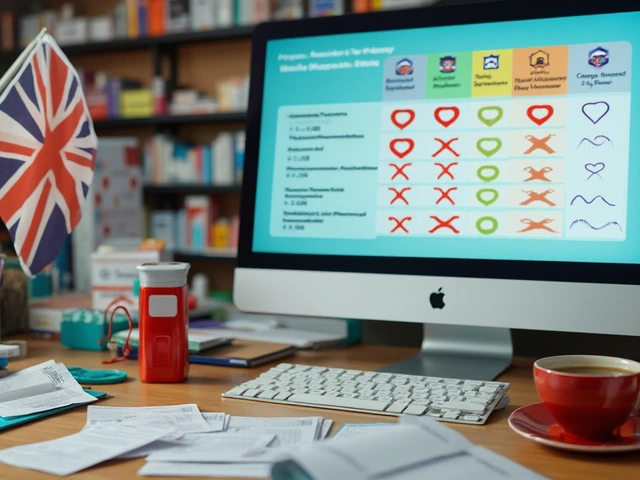Understanding Bronchitis and Its Causes
Bronchitis is an inflammation of the bronchial tubes, which carry air to and from the lungs. This condition can be caused by a variety of factors, including viral and bacterial infections, environmental irritants, and even allergies. When the bronchial tubes become inflamed, they produce more mucus than usual, leading to a persistent cough, shortness of breath, and chest discomfort. Identifying the cause of bronchitis is crucial to determining the appropriate course of treatment and whether antibiotics are necessary.
In most cases, bronchitis is caused by a viral infection, such as the common cold or the flu. Viral bronchitis typically resolves on its own within a few weeks, with rest, hydration, and over-the-counter pain relievers to manage symptoms. Bacterial bronchitis, on the other hand, may require prescription antibiotics to effectively treat the infection and prevent complications. However, it's essential to recognize that not all cases of bronchitis require antibiotics, and overusing these medications can contribute to antibiotic resistance.
Antibiotics: The Basics
Antibiotics are medications used to treat bacterial infections by either killing or inhibiting the growth of bacteria. These drugs have been a crucial tool in modern medicine, helping to treat and prevent many serious infections. However, antibiotics are not effective against viral infections, which account for the majority of bronchitis cases. This is a crucial distinction to understand, as using antibiotics to treat viral bronchitis will not improve symptoms and may even cause harm in the form of side effects and antibiotic resistance.
There are many different types of antibiotics, and the choice of medication depends on the specific bacteria causing the infection. For bacterial bronchitis, doctors may prescribe antibiotics such as amoxicillin, doxycycline, or azithromycin. It's essential to take antibiotics exactly as prescribed by your healthcare provider and to complete the entire course of treatment, even if symptoms improve before the medication is finished. This helps to ensure the infection is fully treated and reduces the risk of antibiotic resistance.
When to Consider Antibiotics for Bronchitis
As mentioned previously, the majority of bronchitis cases are caused by viruses and do not require antibiotic treatment. However, there are certain circumstances in which antibiotics may be necessary for treating bronchitis. These situations typically involve bacterial infections, which can be identified through clinical evaluation and testing by your healthcare provider. Some possible indications for antibiotic treatment of bronchitis include:
- Persistent symptoms lasting longer than 10-14 days
- High fever accompanied by chills and body aches
- Severe chest pain or difficulty breathing
- Green, yellow, or bloody mucus production
If you are experiencing any of these symptoms, it's essential to consult with your healthcare provider to determine the appropriate course of treatment. They will likely perform a physical examination and may order additional tests, such as a chest X-ray or sputum culture, to confirm the presence of a bacterial infection.
Potential Risks of Unnecessary Antibiotic Use
While antibiotics can be lifesaving medications, their overuse and misuse can have significant consequences. One of the primary concerns with unnecessary antibiotic use is the development of antibiotic resistance. This occurs when bacteria evolve to become resistant to the medications designed to kill them, making infections more difficult to treat and increasing the risk of complications.
Additionally, antibiotics can cause side effects, such as nausea, vomiting, diarrhea, and allergic reactions. These side effects can range from mild to severe and may even be life-threatening in some cases. By only using antibiotics when necessary and under the guidance of a healthcare provider, we can help to minimize these risks and preserve the effectiveness of these essential medications.
Alternative Treatments and Home Remedies for Bronchitis
If you're dealing with viral bronchitis or a mild case of bacterial bronchitis that doesn't require antibiotics, there are several home remedies and alternative treatments that can help manage symptoms and support recovery. These options can be used in conjunction with any prescribed medications and should be discussed with your healthcare provider. Some potential treatments and remedies for bronchitis include:
- Rest and hydration to support your immune system and promote healing
- Over-the-counter pain relievers and fever reducers, such as acetaminophen or ibuprofen
- Cough suppressants and expectorants to manage cough and mucus production
- Warm, moist air from a humidifier or steamy shower to help soothe irritated airways
- Honey or throat lozenges to ease cough and sore throat
Remember that these remedies are meant to help manage symptoms and support your body's natural healing process, but they will not cure the underlying infection. It's essential to consult with your healthcare provider if your symptoms worsen or do not improve within a reasonable timeframe.
Preventing Bronchitis and Promoting Lung Health
While not all cases of bronchitis can be prevented, there are several steps you can take to reduce your risk and promote overall lung health. These measures include:
- Washing your hands regularly with soap and water to prevent the spread of germs
- Receiving recommended vaccinations, such as the flu shot and pneumococcal vaccine
- Avoiding smoking and exposure to secondhand smoke
- Wearing a mask when exposed to environmental irritants, such as dust or fumes
- Practicing good overall health habits, such as eating a balanced diet, getting regular exercise, and managing stress
By taking these precautions and seeking prompt medical attention when needed, you can help to minimize the impact of bronchitis on your life and ensure the appropriate use of antibiotic medications.












Lee Llewellyn April 29, 2023
Oh, look, another post preaching the gospel of antibiotic restraint, as if the world needed more holy scriptures. Let’s all bow down to the almighty “watch‑your‑cough” mantra while the real culprits – the pharmaceutical giants – sit on thrones of profit. The article conveniently forgets that the average American has been spoon‑fed antibiotics since birth, and now expects a miracle cure for a simple cough. Sure, “viral bronchitis resolves on its own,” they say, as if our immune systems are flawless machines that never stumble. Meanwhile, the government, in cahoots with Big Pharma, pushes vaccines and masks, while the same “experts” advise us to avoid antibiotics unless we have a fever higher than a desert noon. The list of symptoms that supposedly warrant a prescription reads like a scavenger hunt for doctors to hand out pills. Persistent cough for two weeks? Grab the amoxicillin. Green mucus? Throw in doxycycline. High fever? Time for azithromycin, because why not? The article pretends that a chest X‑ray or sputum culture is a reliable gatekeeper, ignoring the fact that those tests are often ordered just to justify a new prescription. And let’s not forget the romantic notion that completing the full course will somehow prevent resistance, as if bacteria take notes from a kindergarten teacher. In reality, resistance is a silent beast fed by every unnecessary dose, and the only thing that stops it is the collective will to say “no” to a pill you don’t need. So, congratulations to the author for re‑hashing the same tired warnings that have been shouted from every medical conference for decades. If you wanted real insight, you could have asked why hospitals still discharge patients with a half‑filled prescription pad. Or perhaps you could have explored how insurance companies profit from the “watchful waiting” model by billing for extra visits. But no, we get the safe, sanitized version that pretends we’re all enlightened rational actors, when most of us are just trying to survive the flu season without losing our jobs.
Drew Chislett April 30, 2023
Great job laying out the basics of bronchitis and antibiotics. It's refreshing to see a balanced view that acknowledges both the need for caution and the importance of seeking proper medical advice. Staying hydrated and getting plenty of rest are simple steps that can make a big difference. And remember, if symptoms linger, a check‑up is the smartest move.
Rosalee Lance April 30, 2023
We often treat the body as a mere machine, forgetting that each cough is a whisper of our deeper vulnerability. When antibiotics are handed out like candy, we ignore the silent pact we make with evolving microbes. The moral imperative, then, is to respect the delicate equilibrium between host and pathogen, lest we sabotage our own defenses for the illusion of immediate relief.
Kara Lippa April 30, 2023
Absolutely, staying mindful of those subtle signals can really help us make smarter health choices.
Puneet Kumar April 30, 2023
From a public‑health perspective, antimicrobial stewardship programs aim to optimize therapy by integrating pharmacokinetic/pharmacodynamic principles, local resistance patterns, and patient‑centred outcomes. In multicultural settings, it's vital to communicate the risks of unnecessary antibiotic exposure while respecting cultural health beliefs. Leveraging community education initiatives can bridge the gap between clinical guidelines and real‑world practice, ultimately reducing the selective pressure that drives resistant strains.
michael maynard April 30, 2023
Sure, because antibiotics magically cure everything.
Roger Bernat Escolà April 30, 2023
Oh, the drama of believing a pill can fix what a virus does-it’s like expecting a fireworks show to calm a thunderstorm. Some people think the pharmacy is a wand, waving away any discomfort without a second thought.
Allison Metzner May 1, 2023
One must question the epistemological framework that permits laypersons to dictate clinical protocols, especially when the discourse is saturated with pseudo‑scientific rhetoric masquerading as fact.
william smith May 1, 2023
Stick to the guidelines: viral bronchitis gets rest, fluids, and OTC meds; antibiotics only if a bacterial infection is confirmed.
Timothy Javins May 1, 2023
If you think the article covers everything, you’re missing the hidden agenda behind the “no‑antibiotics” mantra.
Kay Yang May 1, 2023
Really solid info, and I appreciate the calm tone-thanks for the clarity 😊
Rajesh Kumar Batham May 1, 2023
Great rundown! 👍💊🌿
Bill Gallagher May 2, 2023
First, let me clarify a common misconception: antibiotics are not a panacea for all respiratory ailments; they specifically target bacterial pathogens, not viruses, which comprise the majority of bronchitis cases. Second, the pharmacodynamics of amoxicillin, for instance, require a time‑dependent killing effect, meaning serum concentrations must remain above the minimum inhibitory concentration for a sufficient duration-something that is often overlooked in outpatient prescriptions. Third, patient adherence to the full course is paramount, as premature discontinuation can foster sub‑lethal exposure and encourage the selection of resistant strains; this point cannot be overstated. Fourth, diagnostic stewardship, including the judicious use of sputum cultures and chest radiography, serves to refine therapeutic decisions, reducing empirical over‑prescribing. Fifth, the economic impact of unnecessary antibiotics includes not only direct drug costs but also indirect costs associated with adverse drug reactions and the broader societal burden of resistance. Sixth, evidence‑based guidelines from organizations such as the IDSA provide clear criteria-such as persistent fever beyond 48 hours or purulent sputum-under which antibiotics may be justified. Seventh, clinicians should also consider patient‑specific factors, including comorbidities like COPD, which may alter the risk‑benefit calculus. Eighth, public health campaigns that emphasize “watchful waiting” must be coupled with clear communication strategies to avoid patient anxiety. Ninth, ultimately, the responsible use of antibiotics hinges on a collaborative effort between providers, patients, and policymakers to preserve the efficacy of these vital drugs for future generations.
Rajashree Varma May 2, 2023
We all want to stay healthy so we should listen to our bodies and give them what they need without overcomplicating things the best approach is simple rest hydration and when needed a doctor’s guidance can keep us on track
Anshuman Pandey May 2, 2023
In thinking about bronchitis we see a microcosm of the larger battle between human ingenuity and microbial adaptation; each prescription is a move on a chessboard where the opponent learns from every misstep.
Thomas Malloy May 2, 2023
Good summary, thanks.
Sushma Gowda May 2, 2023
Keep up the balanced approach-educating about when antibiotics truly help while promoting preventive measures empowers everyone to make better health decisions.